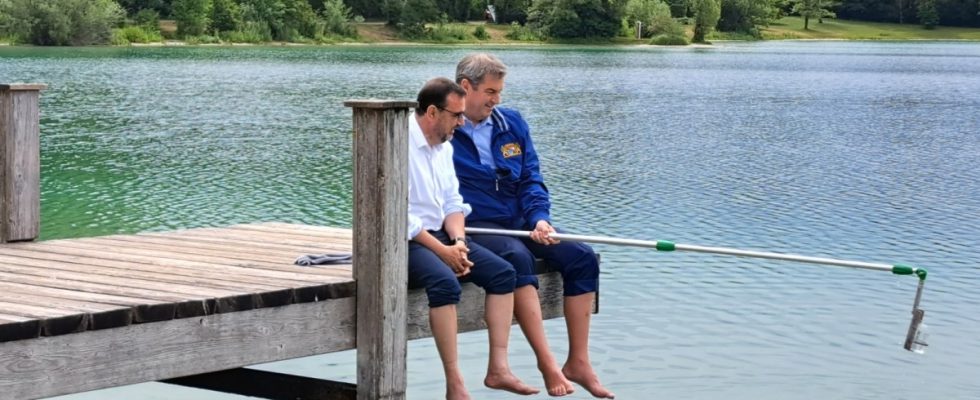The Prime Minister walks the path to the lake in a rain jacket with the Free State coat of arms, but immediately recognizes the potential for jumping in. “I’ll have to swim through it soon,” Markus Söder murmured to his companions on Thursday. For him, too, swimming is “something wonderful, it cleanses body and soul,” he says when he arrives on the shore of the Regattaparksee in Oberschlussheim, north of Munich. And, says Söder: “Baden and Bavaria are closely related.” You live in a “leisure and water country”, there is “real, good beach feeling”, you don’t have to go to the Adriatic Sea, the Riviera or to Mallorca. Especially in view of the fact that the water quality has been checked almost everywhere and is harmless by the authorities.
That’s why Söder, together with his Health Minister Klaus Holetschek (both CSU) and the President of the State Office for Health and Food Safety (LGL), Christian Weidner, invited the press to the Regattaparksee – to offer people in Bavaria and tourists “carefree bathing fun”. prospect of local lakes. Since the end of April, the LGL has been microbiologically examining more than a thousand water samples that were previously taken by local health authorities. Incidentally, they do this not only before the bathing season, but regularly again and again until September. Holetschek and Weidner explained that more than 97 percent of the bathing waters were classified as “excellent” or “good” in terms of their hygienic quality.
Only a few samples had shown increased concentrations of intestinal bacteria, but immediate control samples had subsequently confirmed good hygienic water quality in all cases. The conclusion “for the most part” was: “first class”. In an online atlas from the state office, the results and, if necessary, precise information from the authorities can be read in compact form – www.lgl.bayern.de/badegewaesserkarte.
It is specifically about all 373 official EU bathing areas at 291 lakes in Bavaria. This list only includes waters where a large number of bathers is expected and where it is not permanently discouraged to go in anyway. According to an EU report from June, with data from 2022, only two lakes in Bavaria are said to have poor water quality: Lake Garching in Garching near Munich and Lake Freigericht-Ost in Kahl am Main. There were also some lakes with only adequate water quality. The time course is always decisive for the overall assessment, according to LGL boss Weidner a “stability index”, i.e. not the snapshot.
According to Weidner, the intestinal bacteria are defects “that you can’t see right away”. This is different with blue-green algae and cyanobacteria. If there is a suspicion – which is usually quickly apparent – in lakes that they occur in higher concentrations, samples are also examined for this. As a result of climate change, problems with blue-green algae could possibly occur in more bodies of water in the future, it said. In this regard, however, only individual bodies of water are questionable in the new data sets, such as Lake Mandichose in the greater Augsburg area. According to the Ministry, contamination from heavy rain or waterfowl can be the trigger for occasionally poor measurement results. “Each of us can contribute to maintaining the water quality of our bathing lakes: for example, by disposing of our rubbish properly and not feeding waterfowl at bathing waters,” said Holetschek.
“We don’t want supervised swimming”
Söder added that swimming skills are also required for bathing fun, “the old sentence with little Hans and Hans also applies here”. According to surveys, 20 percent of elementary school students cannot swim safely. Therefore, the state government’s seahorse voucher program is important, he praised. A few weeks ago, his cabinet also decided on better support for municipalities in the construction of school swimming pools and in the renovation of bathrooms. The Greens, however, criticized the measures at the time as not being powerful enough, “pure window dressing” – the renovation backlog at municipal pools now amounts to 1.8 billion euros. The seahorse campaign is useless if there are no pools and swimming lesson staff.
Speaking of the pool. The nationwide debate is currently not about bathing lakes, but about outdoor pools – according to reports of escalating aggression, apparently mainly from young people of Arab origin, in a Berlin outdoor pool and sometimes elsewhere. Federal Interior Minister Nancy Faeser (SPD), for example, had suggested more police presence in the facilities. Söder said in Oberschleißheim that previous events in Bavaria were “not comparable”. The Free State succeeds best in integration, despite the strongest immigration, as can be seen in statistics on crime and the labor market. But: “The outdoor pool as a dangerous situation, that doesn’t work at all.” Municipalities are required to use security forces if necessary. Police presence can only be the exception, “we don’t want supervised swimming”.

